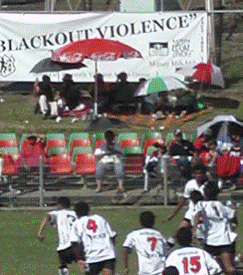Think rugby league and you think big hits and hard tackles – but an award-winning campaign has used the ‘greatest game of all’as the starting point to change community attitudes to violence. To launch the ‘Blackout Violence’program, players from 85 rugby league teams took to the field at the 2004 NSW Aboriginal Rugby League Knockout wearing purple armbands to show their opposition to family violence and sexual assault against women. Around 2,000 Blackout Violence kits were handed out to players and spectators throughout the four- day carnival, containing information on how to prevent violence and where to get help. The rugby league knockout is the largest gathering of Aboriginal people in NSW so it was the perfect place to get the message out, said campaign organiser Dixie Link-Gordon.

"The message of Blackout Violence is simple: enough is enough. Family violence has no part in our culture. It’s not the Koori way and it needs to stop,"Ms Link-Gordon said. "It’s a difficult issue to talk about and we’ve put it under the carpet for too long. But this campaign has allowed a large number of people to take an important message back to their own communities." Metropolitan Aboriginal Land Council Chairperson, Rob Welsh, said the Blackout Violence campaign showed Aboriginal people taking a leadership role by tackling the problem head on. "Blackout Violence is all about us taking control of our actions and showing respect for each other and our communities. By doing this we can show the way for other communities around Australia – black and white,"he said.
The starting point for the state-wide campaign was a peaceful rally held by a number of women from Redfern’s ‘Block’, who came together to protest against the violent rape of a local woman. The rally drew more than 100 people and a co-ordinated grass-roots campaign soon followed. The Blackout Violence program was set up and run without any government funding. However, its success has been recognised with the 2004 NSW Violence Against Women Prevention Award.
"The focus of the campaign has always been on community engagement and that’s why it been such a success,"said Blackout Violence partner, Christine Robinson, from the Wirringa Baiya Aboriginal Women’s Legal Centre. "From the start Indigenous men, women and children have all supported the program. They are determined to change how their community views and deals with issues like domestic violence."
A training manual has been developed to support Indigenous communities address violence in all its forms – domestic violence, community violence and other forms of violence, such as bullying. Following the success of Blackout Violence, a national roll-out of the program is being planned.
However, funding to print and distribute the manual is required. The program has also drawn interest and support from a wide range of groups, including police, courts, universities, community groups and health services. "It is very important this campaign continue to be driven and maintained by Aboriginal people but supported by non-Aboriginal people,"said Ms Link- Gordon. Blackout Violence was developed by the Inner City Domestic Violence Group, Redfern Legal Centre and the Metropolitan Aboriginal Land Council.
Mudgin-Gal Aboriginal Women’s Corporation
Email: office@mudgin-gal.org.au
Phone: 02 9319 2613
National domestic violence hotline 1800 656 463
This is an excerpt from Success stories in indigenous health; A showcase of successful Aboriginal and Torres Strait Islander health projects published by ANTaR Ph: 02 9555 6138 antar@antar.org.au
Available online http://www.antar.org.au